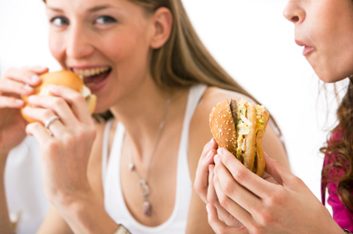
Bad habit: Eating on the run
Most of us have caught ourselves walking and eating, or stuffing down a meal to get to our next commitment on time. “Eating on the run often leads to eating too quickly for your hunger and satisfaction signals to keep up,” says Mary Bamford, registered dietitian (newtopia.com). What’s too fast? According to Bamford it means taking less than 20 minutes to eat a meal.
Simple fix: Sit down (eating in the car while driving doesn’t count) and slow down. “If you eat in a hurry and rely on your hunger signals to know when you’ve had enough, you have to overeat to feel satisfied,” she says. “And then 30 to 60 minutes later, if you are paying attention, you may realize you are stuffed,” she adds. So stop walking and munching, and make time to savour your meals.

Bad habit: Night noshing
Do you eat relatively well during the day, only to ruin your efforts at night with double servings of pie? Some people indulge in habitual snacking late in the evenings, says Bamford’s Newtopia colleague, clinical psychologist Kathryn Hood (newtopia.com). “Indulging in leftovers or favourite foods often occurs out of boredom or loneliness, or as a means of de-stressing after a long day, Hood says. “Noshing at night frequently happens alone in front of the TV or once the children are in bed-and often during times when others are not around to see how much you are eating.”
Simple fix: Stock up on healthy snacks. “Keep healthier snacking options available for times you get that urge to snack in the evening,” Hood says. “It’s better to overindulge in fresh fruit or yogurt once in a while, when a sweet craving hits, versus having chocolate cake and ice cream.”

Bad habit: Opting for quick, big meals
You’re hungry, you’re busy and you’re surrounded by fast, supersized convenience meals. Quick meals are part of our high-speed culture right now, Bamford says. It’s easy to go overboard and eat more than you actually need.
Simple fix: Go for smaller portions. “You don’t need to gain weight by accidentally overeating when you are short on time. People who prevent weight gain when eating quickly do so by picking a smaller-than-usual portion,” Bamford says. How small? About 15 to 25 percent smaller than what you eat on average. Although you may not feel satisfied right away, satisfaction does settle in about 30 minutes later, Bamford assures. “Our energy needs vary from day to day, so when you are in a hurry, assume you are in a ‘lowest energy needs’ day to prevent accidental overeating.” If you’re eating out, choose smaller or even kid-sized menu items.

Bad habit: Late-afternoon snack attacks
“Busy people often muscle through the day, grabbing food on the go while running errands, or skipping meals in favour of spending extra time in the office,” Hood says. “This haphazard style of eating can leave you beyond hungry by the time you reach home, and primed to raid the fridge before dinner.”
Simple fix: Eat meals. “Strive to eat balanced meals at regular intervals in your day,” says Hood. “If you consistently fuel your body with nutritious and tasty whole-foods, you will be less likely to come home famished and raid the cupboard.” Having a healthy lunch and mid-afternoon snack of a fruit or a handful of nuts, can help to hold you over until dinner, she says.

Bad habit: Comfort eating
You’ve had a bad day at the office so you’re drowning your sorrow in a giant bowl of potato chips. With a soda. And cookies. “So often we reach for a sugary or salty treat to soothe a bad mood or reward ourselves for a difficult day,” Hood says.
Simple fix: Connect with a friend. “Instead of giving in to the urge to eat for comfort, come up with alternative ways to decompress from the demands of your day.” Hood suggests giving someone a call, or going on Facebook to connect with others. “These types of distractions can successfully stifle your impulse to snack. Remember that cravings generally pass in 10 minutes, so if you can busy yourself with another activity during this time, you are less likely to overdo it,” she says.
Related:
• Quiz: What kind of eater are you?
• How mindful eating can help you lose weight
• 8 Reasons why you’re gaining weight
